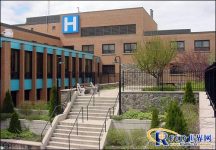
RTLS technology helps Collingwood Hospital in baby tracking and asset tracking
[ad_1]
Recently, Collingwood Marine Hospital in Ontario, Canada successfully deployed Wi-Fi provided by Stanley Medical Center RFIDLabel. In this way, the hospital can better carry out baby tracking, asset tracking and environmental testing. All three functions can be provided and managed by AeroScout MobileView software at Stanley Medical Center. For the past ten years, Collingwood Hospital has been using the old version of the Stanley Medical Center’s baby tracking system, which will automatically send an alarm when the baby leaves the obstetric area. But this system has one drawback-it cannot track the exact location of the baby leaving the obstetric area. Therefore, the hospital finally chose a new system with WiFi RFID tags.
Collingwood Hospital has 72 beds, of which 5 are in obstetrics and gynecology, serving an average of 500 babies each year. In 2002, the hospital installed the first baby tracking system (provided by VeriChip, acquired by Stanley in 2008) to manage baby changes. This system includes an RFID reader and a battery-powered tag that supports the RFID protocol. At that time, the hospital was only in the obstetric area, and the other parts of the hospital were not covered at all. The obstetric area has three exits (one of which is a staircase). The hospital not only wants to know the exact location of the baby, but also hopes that the door lock will automatically lock when the baby is taken away from the three exits to prevent any child from being lost.

In February of this year, the hospital began looking for solutions to improve baby tracking, asset tracking, and environmental monitoring. Collingwood’s CFO and Vice President of Corporate Services Michael Lacroix said: “When staff cannot find a wheelchair quickly, they tend to feel frustrated. At the same time, we are often requested to buy a wheelchair. After taking an inventory, we found that the wheelchair is completely adequate, but it lacks a better way to track it.”
In addition, Lacroix added, the hospital is still looking for a way to automatically recognize the temperature and humidity in the operating room. This new system will effectively replace the error-prone manual reading method.
In June 2013, the hospital deployed Hugs Wi-Fi, a beta solution provided by Stanley. Stanley provides a WiFi-based solution that realizes tag tracking management in the entire field at a limited cost. Stanley’s senior marketing manager Steve said: “Because most hospitals have WiFi networks, it is possible to monitor the location of babies throughout the hospital, even in the parking garage. This effectively prevents kidnapping.”
The Hugs Wi-Fi solution includes a MobileView software platform provided by Stanley and a Web-based application that can be connected to the hospital’s back-end system. Steve said: “This system has significantly improved the workflow. Nurses no longer need to go to the nurse’s office to operate the software. They can connect to the background data through a PC, laptop or tablet.”
At Collingwood Hospital, babies born will wear a Hug wristband. The wristband has a unique ID code and is connected to the MobileView software. The wristband information contains information about the baby and mother. This tag uses WiFi protocol and transmits 2.4Ghz signal every set time. At the same time, the tag is also equipped with a built-in sensor, when the wristband is loose or taken off, it will automatically warn.
When the baby is taken away from the exit, the special RFID placed at the exitReaderWill recognize this action. Then, the reader will transmit this information to the MobileView software platform via Ethernet. Then, WiFi nodes in the vicinity will receive this information and automatically lock the elevator or stairway door. If the kidnappers continue to take the baby out of the house, the system will continue to monitor the baby’s location and transmit the information to the InstantNotifier software. At the same time, InstantNotifier will also push this information to the hospital’s Cisco IP phone or Apple mobile phone.
In February of this year, Collingwood Hospital began to use the WiFi-based RFID tag solution provided by Stanley for asset tracking. Lacroix recalled: “Initially, we used this system to track the position of the wheelchair. Now, we can easily find the position of the wheelchair in a short time.”
At the same time, the hospital also installed Stanley’s Wi-Fi RFID sensor tag AeroScout in the operating room. When the temperature or humidity in the operating room drops outside the set area, InstantNotifier will send this warning to the staff via email or iOS app. Lacroix said: “This saves a lot of staff time.”
Lacroix said: “It is impossible to quantify the value of this solution. However, it can free us and allow us to do more value-added things.”
(Exclusive manuscript of rfid world network, please indicate the source author for reprinting!)
[ad_2]



